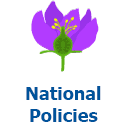 Every country has developed, formulated, and decreed national policies related to rural advisory services. Find some examples here. If you are looking for a national policy from a specific country, please use the search function, selecting the category “National policies” and the tag for the country.
Every country has developed, formulated, and decreed national policies related to rural advisory services. Find some examples here. If you are looking for a national policy from a specific country, please use the search function, selecting the category “National policies” and the tag for the country.
This paper describes a framework for improving the coordination of agricultural support services. The paper is based on a PhD study: Developing a framework for improving coordination in the provision of agricultural support services in the Oshikoto region of Namibia. Most of the information in the paper is drawn from the Namibian governance system, which was established through the Decentralisation Policy of 1997. It also makes use of data collected from 200 farmers and 11 agricultural support service providers from the Oshikoto region, who were interviewed during the PhD research. The paper includes an overview of the challenges and opportunities involved in operationalising an agricultural support service framework.
Additional Info
- Author(s) Jona Cecilie Ndeshipanda
- Year 2016
- Type of Content Conceptual (definitions and frameworks)
- Type of Document Research Papers and Studies
- Country/Region Namibia
This article explores possibilities for strengthening the capacity of rural advisory services (RAS) actors to become involved in advocacy and dialogue on policy reform and action. RAS actors include individuals and organisations in the agricultural innovation system that play a role in RAS and/or need to be included in RAS policy dialogue processes. These include governments, research/education institutions, farmers’ organisations, civil society organisations, the private sector, donors, input suppliers and agro-dealers. The article is based on practical experiences from the Food, Agriculture and Natural Resources Policy Analysis Network (FANRPAN) and the Global Forum for Rural Advisory Services (GFRAS).
Additional Info
- Author(s) Mwamakamba, Sithembile, Ngwenya,Hlamalami and Ernst, Natalie
- Year 2016
- Type of Content Conceptual (definitions and frameworks)
- Type of Document Research Papers and Studies
Define priorities clearly is essential for structuring, resourcing and training the extension service and for monitoring and evaluating its performance. The focus may change over time depending on circumstances, e.g., natural disasters, new industry, service development by NGOs and private sector. Farmers must have an effective voice in determining national research and extension priorities—through regular meetings, workshops or farmer advisory groups, or a centrally managed survey. Below is an example of a priority setting tool that can be used with stakeholders to determine priorities for the extension service.
From: Developing a Policy Framework for Extension Systems. Secretariat of the Pacific Communities. Policy Brief 12/2010
Additional Info
- Author(s) SPC
- Year 2010
- Type of Content Conceptual (definitions and frameworks)
- Type of Document Position papers and reports
- Country/Region Pacific Islands
CGIAR Research Programs (CRPs) are required to show how their work contributes to development outcomes such as changes in policies. While better evidence has the potential to improve decision-making, it is insufficient for achieving policy impacts. That evidence needs to be communicated effectively so that it is useful to targeted decision-makers, and decision-makers need to have the incentives and the capacity to use it. This requires that researchers and their partners understand how policy processes work and how they can be influenced. Deliberate strategies to influence policy can also be the basis for assessing the extent to which research has contributed to a change in a policy or in the policy process—for example by influencing the discourse, attitudes, behaviors or actions of decision-makers.
Additional Info
- Author(s) IFPRI
- Year 2013
- Type of Content Conceptual (definitions and frameworks)
- Type of Document Research Papers and Studies
We should view extension policy as something beyond a statement of intent. It must be a means to develop strategies, procedures, and working relationships among a large number of other actors in the wider system where extension is situated. This note reviews the extension policy development process in four countries and examines some of the implementation challenges. It also highlights the need for more clarity on the purpose of policy, the importance of policy learning, and why efforts to achieve policy coherence are important for extension.
Additional Info
- Author(s) R. Suleiman
- Year 2014
- Type of Content Manuals and guidelines (how-to)
- Type of Document Research Papers and Studies
In the face of declining resources, national extension services need to review their priorities and modes of delivery. A policy framework that provides the national extension service and other actors with strategic direction can help to ensure that resources are targeted to where they are needed most in line with client needs and national priorities; that extension staff receive the appropriate training to carry out their duties; and that scarce resources are used more effectively through partnerships with NGOs and the private sector and use of information and communication technologies where appropriate. Monitoring and evaluating performance based on stakeholder feedback is also crucial to ensuring that extension staff skills remain up to date and relevant to client needs.
Additional Info
- Author(s) Secretariat of the Pacific Community
- Year 2011
- Type of Content Manuals and guidelines (how-to)
- Type of Document Brief
This document describes the Federation of Free Farmers Cooperatives efforts to influence the formulation of proper RAS policies and their translation into effective programs and services that benefit small-scale producers in the Philippines.
Additional Info
- Author(s) Raul Montemayor
- Year 2014
- Type of Content Case study, experience, example
- Type of Document Research Papers and Studies
- Country/Region Philippines
The Comprehensive Agricultural Policy Framework document gives the situation analysis of the agricultural sector, highlights the vision, goals, objectives and detailed policy statements and strategies for the development of the Zimbabwean agricultural sector during the period 2012 – 2032.
Additional Info
- Author(s) n.a.
- Year 2012
- Type of Content Case study, experience, example
- Type of Document Endorsed policy documents
- Country/Region Zimbabwe
This document highlights the Vision, Policies, and detailed Strategies for the development of the Zambian Agricultural Sector during the period 2004-2015. The main thrust of the National Agricultural Policy are increased production, sector liberalization, commercialization, promotion of public and private sector partnerships and provision of effective services that will ensure sustainable agricultural growth.
Additional Info
- Author(s) Ministry of Agriculture and Co-Operatives, Republic of Zambia
- Year 2004
- Type of Content Case study, experience, example
- Type of Document Endorsed policy documents
- Country/Region Zambia
This document is a draft of the National Fisheries Policy. The aim of the policy is to provide an overall national vision for the development of the sector. The National Fisheries Policy seeks to give substance to the national fisheries vision.
Additional Info
- Author(s) Ministry of Agriculture and Co-Operatives, Republic of Zambia
- Year 2008
- Type of Content Case study, experience, example
- Type of Document Endorsed policy documents
- Country/Region Zambia
More...
The Ministry of Agriculture and Co-operatives has adopted the participatory Extension Approach (PEA) and institutionalized it as the Extension Methodology, to be used in Agricultural Extension
Additional Info
- Author(s) Ministry of Agriculture and Co-operatives, Republic of Zambia
- Year 2009
- Type of Content Manuals and guidelines (how-to)
- Type of Document Endorsed policy documents
- Country/Region Zambia
This manual describes some technical aspects in Monitoring and Evaluation for field extension workers. It describes some procedures in indicator setting, use of various tools and sources of information that is used for monitoring purposes.
Additional Info
- Author(s) Ministry of Agriculture and Co-operatives, Republic of Zambia
- Year 2009
- Type of Content Manuals and guidelines (how-to)
- Type of Document Endorsed policy documents
- Country/Region Zambia
This manual is designed to provide guidelines on key elements of participatory extension approach. It is recommended for all field workers in the Agricultural sector and development workers involved in the facilitation of community development.
Additional Info
- Author(s) Ministry of Agriculture and Co-operatives, Republic of Zambia
- Year 2009
- Type of Content Manuals and guidelines (how-to)
- Type of Document Endorsed policy documents
- Country/Region Zambia
This is the final draft of Zambia's National Agriculture Policy (NAP). The revised NAP 2012-2030 provides policy recommendations and action areas to enable agribusiness to produce and commercialise in an environment with clear rules that are predictable and stable, with the government focusing on facilitating, supporting and providing incentives for productive activities.
Additional Info
- Author(s) Ministry of Agriculture and Co-operatives, Republic of Zambia
- Year 2011
- Type of Content Case study, experience, example
- Type of Document Endorsed policy documents
- Country/Region Zambia

